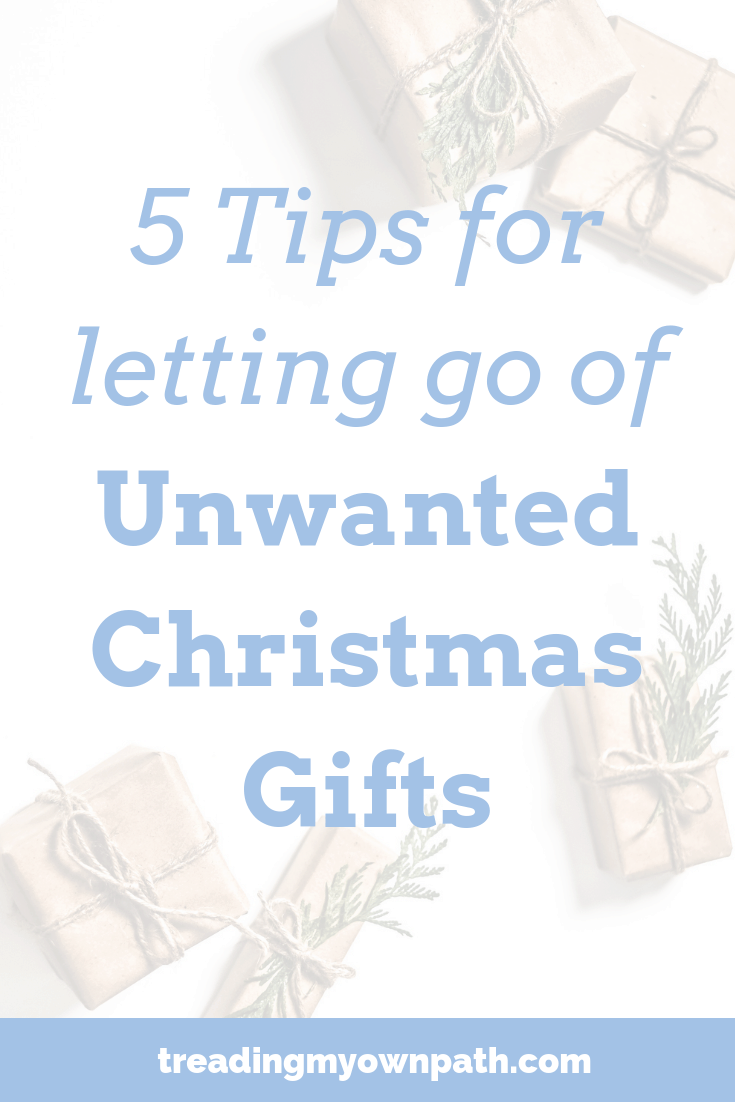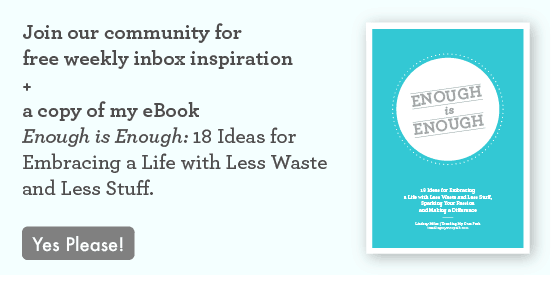5 Tips for Letting Go of Unwanted Christmas Gifts
Before you even say it, no. It is not too early to be talking about what to do with unwanted Christmas gifts. If we don’t talk about it, those gifts will be shoved in a cupboard, where they will languish untouched for months, forgotten and unused.
What a waste of resources!
The best outcome for these gifts is that they are needed, wanted and well used.
If you or someone you know received a gift that they don’t want, it is much better to find someone who needs it rather than stuffing it into storage.

The Reasons We Hang Onto Stuff We Don’t Need: Guilt and Fear
Is it ungrateful or rude to pass on a gift that’s unwanted? I don’t think so. No-one asks for gifts they don’t want and don’t like. The gifter may have had the best intentions, but on this occasion, they got it wrong.
We all make mistakes and misjudge things sometimes. That’s just how life works.
It was still kind and generous that they gifted something, and the meaning is in the giving, not the actual object.
But when it comes to letting go of the gift, we can feel guilty.
We feel guilty that they made a poor choice.
We feel guilty that we weren’t clearer about our dislike of hot pink, or the fact we actually went vegan 7 years ago, or the fact that we already own every single cookbook/novel by that author.
We feel guilty that they wasted their time, or money.
The thing is, all of this is about the past. The gift has already been purchased and gifted, and we can’t turn the clocks back. Whether we keep something or give it away won’t change the fact that the gift was a poor choice.
The difference is that keeping something reminds us of this, every time we see the item. Letting something go will let go of this guilt.
Finding new owners for our unwanted things is a great way to alleviate the guilt we feel about parting with stuff – it is hard to feel guilty when you’re bringing joy to someone else.
When it comes to letting go, we can also be fearful.
Fearful that the gifter will find out, and we’ll be judged.
Fearful that if we’re found out we will be seen as ungrateful and maybe not be given gifts again.
This fear is about something that hasn’t happened yet. It may never happen. Is it really a genuine cause for concern, or if it comes true, will it actually be slightly uncomfortable for a very small window of time?
Fear and guilt are not reasons to keep things we don’t need.
Think about it from your own perspective. How would you feel if you knew that a gift you’d purchased for someone was unwanted, disliked and would never be used? Would you rather the person kept it out of guilt or fear, or would you rather they passed it onto someone who loved it?
To Tell or Not Tell?
There’s no need to tell the gifter you don’t like the gift and you’re passing it on, if you don’t want to. If you think it will upset someone, or you’ll feel judged, there’s no need to mention it.
Most people won’t ask what became of the gift, but if you’re worried about that, have an answer at the ready.
If the gifter told you that they kept the receipt in case you want to exchange it, consider that an invitation to tell them that you’d like to exchange it. Obvious as that seems, it can be an awkward conversation, and one we prefer to avoid. But the fact they mentioned it means they’d rather you had something you actually liked than try to protect their feelings. If this option exists, don’t shy away from it.
On the other hand, you might prefer to tell the gifter of your plans. If they were wildly wrong with size, style or taste it may be helpful to say so.
If you put clear boundaries around the gifts you wanted and didn’t want, and these boundaries were trampled over (oh, I know you said only second-hand gifts but these plastic trashy items from the big box store were such bargains!) then it can be helpful (and rather satisfying) to explain your decision. It will also help clear up future misunderstandings.
Don’t forget, if they have no way to know you didn’t like the gift, they may continue to gift in the same spirit.
There’s no right or wrong answer to this. Do what feels right (or easier).
Options for Letting Go of Christmas Gifts
Take it back to the Store.
Some stores will let you exchange items even without a receipt over Christmas, so it is worth asking. Call ahead before you make the trip to double-check. The item will need to be still tagged and unused. You won’t get a refund, but if you simply want to switch size or colour, or swap for another product it is probably the lowest hassle solution.
Sell It.
Online auction platforms like eBay and classifieds platforms like Craigslist and Gumtree are great for listing items for sale from the comfort of your own home. Decide a price you’re happy with, take a few pics, and wait for a buyer. There are also marketplaces on social media for finding interested buyers.
Donate It.
Rather than dump your unwanted gift at the closest charity shop along with all the other unwanted gifts, consider giving the item away by other means. Charity shops are overloaded at this time of year, so it might be better to donate to an organization that will use the item, rather than resell it. For example, a homeless charity might accept sleeping bags and blankets, a refugee centre might take small electrical appliances, women’s refuges might take cosmetics and personal care products, and a food bank will accept food items.
Ask yourself, who might want what I have?
You can also give items away on online classifieds platforms, you can give away via local neighbourhood networks such as Buy Nothing groups, and you can regift – if you think the person will want the item.
If you’re worried about being judged for passing on unwanted Christmas gifts, donating them to a worthy cause can help. It might be a lot easier to say you donated something to an animal rescue centre or hospice than it is to say you sold it on eBay.
That’s not to say one choice is better. As long as the item ends up in the hands of someone who will use it, it is a good outcome.
Letting go of something we don’t need, don’t want and don’t like; it doesn’t make us ungrateful or selfish. It doesn’t make us greedy (if we decide to sell it). Stuff shouldn’t have that kind of power, and it only will if we allow it to. The best thing to do is to pass the item on. Out of sight, out of mind.
Difficult things become easier, and guilt will pass.
Now I’d love to hear from you! What do you do with unwanted gifts? Any additional tips? Do you struggle with guilt? How has this changed over the years? Do you find it easier now than you used to? Any other thoughts? Share all in the comments below!








Wonderful words! They helped me a lot think about getting rid of unwanted presents which I have kept at home for many years. My first new year resolution. Thanks a lot.
Hi Kacka and thanks for your comment :) Good luck and be gentle on yourself, letting go gets easier in time…
I’m at the point where I know intellectually all you are saying, and I can remind myself of it verbally, but the shroud of disappointment can still come. It only stays a little while, however, and my reactions get better with time.
I can totally relate, Lauren! understanding is the first step, being able to move past the feelings is definitely another step! But as you say, it does get easier with time, and with practice… and the more we do it and realise the end of the world doesn’t come, the more we can use this to remind ourselves the next time we are struggling :)
Top trip for heading off unwanted Christmas gifts when traveling: Don’t bring a checked bag and let people know you will only have a carry-on bag and thus no room to tote back extra items.
This was the first Christmas spent with my new in-laws. They have had a few years to get to know me and my minimalist/waste-free ways and they did pretty well respecting this about me, for which I am very grateful. I’ll send them all thank you notes (made of upcycled cardboard ;) ) thanking them for their sentiments and highlighting my genuine gratitude for their donation to my favorite charities and taking my husband and me to the movies, so they’ll know which actions really stuck out for me and were truly appreciated. Then in a few months I may explain why I do not want the extra tidbits (like the holiday-themed rubik cube…) or the pre-packaged foods. Next year I’ll also try to head off their holiday game involving unraveling 300 ft. of plastic wrap to find the chocolate Santa in the center. Perhaps they’ll be open to a recycled paper mache pinata instead!
My worry is always coming off as ungrateful and preachy. It’s a tricky balance, loved ones’ emotions vs. protecting the future of the planet. Anyway, thank you for the good advice and helping me feel less abnormal in this world of waste.
Oh, BW, that sounds challenging, but I love your advice! Reminds me of when I was moving overseas and people gave me books as farewell gifts. Books! There aren’t many things that can bulk up your luggage more than books!
Thanks for that! I haven’t really had the issue getting rid of gifts immediately but my husband has always thought of it as being ungrateful so it’s nice to have it in words on how truly is for me!
Thanks for all these great ideas to avoid waste! I like to prevent the issue from even occurring in the first place by calling or sending emails 1-2 months before get-togethers suggesting “experiences” as gifts instead of material items. Events like museum visits, theater, skiing, hiking – the possibilities are endless!
Dear Lindsay I always enjoy your blog posts, and your words are a great touchstone in the journey to a less wasteful lifestyle. Two more ideas to share :- I give unwanted books to our local library and unwanted Christmas food goodies to the Foodbank. Happy New Year to you.xx
But check with the library first. Not all libraries want extra things, or even do their own cataloguing and covering so they’ll throw the book out.